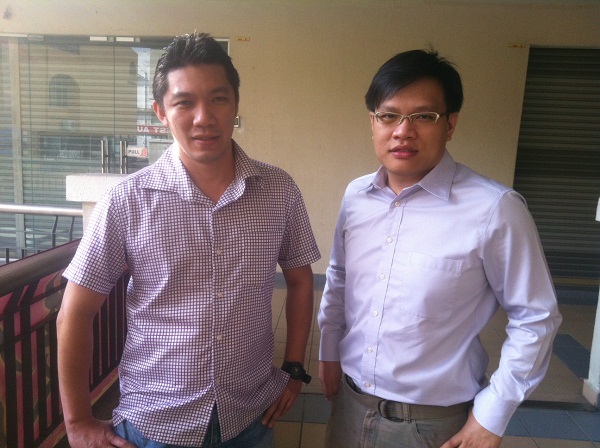Where ideas don’t count; not at first anyway
By Karamjit Singh January 18, 2013
- Founder Institute Malaysia to focus on picking those with right mindset and traits for pioneer intake
- Pool of local and international mentors to help accelerate growth of those chosen for program
 “ARE you ready to be an entrepreneur? Can you rely on yourself to earn a living?” posed Chu Tzu Ming, who along with Heislyc Loh (pic, right), heads the Malaysia chapter of the Founder Institute (FI Malaysia).
“ARE you ready to be an entrepreneur? Can you rely on yourself to earn a living?” posed Chu Tzu Ming, who along with Heislyc Loh (pic, right), heads the Malaysia chapter of the Founder Institute (FI Malaysia).
Chu (pic, left) was speaking at the inaugural event of FI Malaysia, Startup Pitch Bootcamp. Billed as an event to help attendees understand the key ingredients of a successful pitch, it was also a pitch in turn by FI Malaysia to the 100 or so people crammed into the too-small venue.
The stats shared were impressive. Out of the over 675 companies that have graduated globally from the accelerator’s programs since it started in 2009, only 9% failed in the first 18 months, while an impressive 40% got funded within six months of graduating.
It should be noted that FI takes in founders based on them having the right set of aptitudes and character traits, and not on the strength of their ideas.
Here, its ‘Predictive Admissions Test’ has been refined to bring out some key traits FI looks for, which it believes underpin the success of many entrepreneurs. Once it identifies these traits in a founder, the strong belief is that the founders will naturally come up with better ideas once they have gone through FI’s four-month program.
Because of this, FI encourages the founding team to participate together, to ensure the founders progress together.
All the companies go through a rigorous screening program before a handful are selected. About 30% of applicants are accepted. Getting accepted also does not mean you graduate. Apparently only 30% do.
But clearly those that do, come out much stronger from the experience of having been mentored by a group of entrepreneurs selected by FI Malaysia.
What’s interesting is that all the mentors listed by Chu are Malaysian, a deliberate move to ensure they understand the socio-cultural context the entrepreneurs come from, and their home market.
But the mentor mix is enhanced by FI’s global pool of over 1,000 mentors spread across 39 cities, and counting. There is also support from around 80 partners which range from various technology companies to tech-related service providers.
Thanks to the molding and shaping that goes on, including working on the mindset of the entrepreneurs, those who graduate from the program are required to offer 3.5% of their equity in the form of warrants into a Bonus Pool. This is exercised whether or not they raise funding after graduating. There have been cases where companies are sold after graduating without the founders raising any equity.
This equity stake is the global FI model. What’s interesting is that the way the 3.5% is shared ensures that founders who graduate also enjoy possible upsides. This is because 30% of the equity goes back into a pool that is jointly owned by all the founders from that graduating batch.
The mentors for each company equally divide another 30% between them while 15% goes to the Founder Institute as a management fee to oversee the Bonus Pool for 10 years; that is, where the founder’s 30% goes.
The final 25% goes to the local operators, Chu Ming and Loh, in exchange for organizing the semester and supporting the graduates.
 Chu’s take on the FI model applies very well to this equity share model too – that is, “Great things happen when smart people get together and work towards a common goal.”
Chu’s take on the FI model applies very well to this equity share model too – that is, “Great things happen when smart people get together and work towards a common goal.”
That goal is to build a successful company and have fun if possible. To illustrate this, Chu and Loh invited Stephanie Chai (pic), founder of TheLuxeNomad.com, and one of the mentors for FI Malaysia, to share some of her learnings in her entrepreneurial journey.
Chai encouraged entrepreneurs to “defend their ground” if a venture capitalist (VC) they are pitching to makes a point that the entrepreneur does not agree with. “Don’t be scared to speak up. VCs want to invest in a winner, not a follower,” she said.
She also shared her initial fears when finding out that Germany’s Rocket Internet was coming into the region. Sleepless nights ensued as she worried about it using its financial heft to sweep aside competitors.
Fortunately, she also quickly found one of the truisms of entrepreneurship: That nothing beats the passion and belief of a founder willing to walk the extra mile.
But perhaps the entry of Rocket Internet has shaped her thoughts about how to defend her market position. Chai is at present trying to raise S$1 million from investors down south.
“I initially thought, why do I need so much money [and probably give up more equity too], but then I can use the money to grow the business more rapidly and more importantly, block competitors from coming in,” she said.
The event certainly gave people plenty to think about. One individual keen to explore the idea of launching a start-up thought it was a great introduction to the local technology and entrepreneurship scene.
“The Malaysian chapter has lined up an impressive list of Founder mentors, and there were some genuinely passionate people with great start-up ideas in the crowd, so it will be very interesting to see how the program develops over the next few months,” he says.
The FAQ at FI website is really useful to plug in the gaps for any questions entrepreneurs have.
Related Story:
Founder Institute breaks ground in Malaysia
For more technology news and the latest updates, follow @dnewsasia on Twitter or Like us on Facebook.


